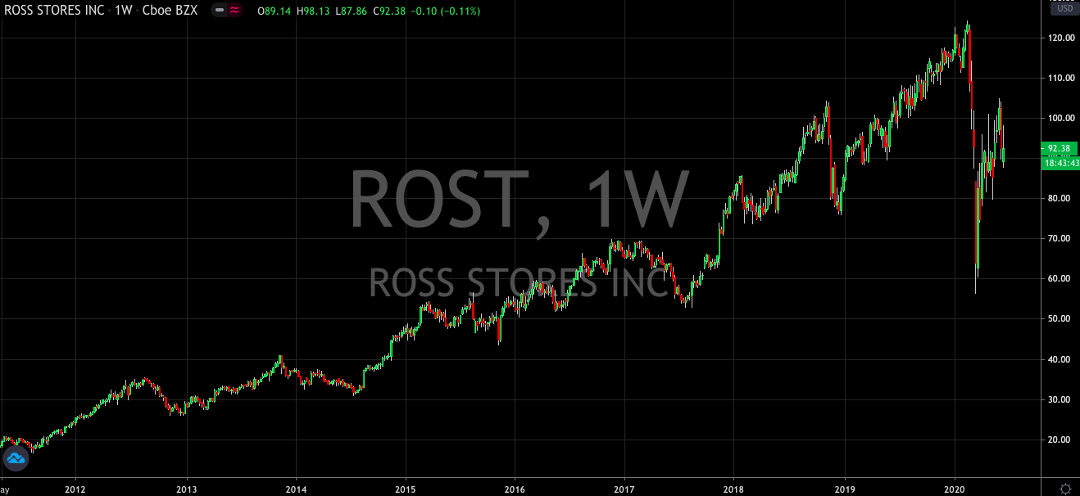As had been the case for many years coming into 2020, discount retail department stores were easily outperforming traditional brick and mortar names when the coronavirus pandemic hit. But the virus and its economic fallout doesn’t choose who it affects or how. All non-essential businesses were shut across the country and millions of consumers were ordered to shelter-in-place almost overnight as the virus hit. Alongside travel, retail was one of the
most hard hit industries, and as a result, many household names are up against the ropes.
Ross Stores (NASDAQ: ROST) had the fortune to be a well-established discount retailer and so was somewhat insulated from the initial hit which took no prisoners among the higher end stores like Macy’s (NYSE: M) and Nordstrom (NYSE: JWN). With unemployment soaring to record highs, incomes across the country quickly dried up, and having that high-end frock and scarf suddenly became less important.
Coming in Hot
As the pandemic recedes and economies begin to shift back into gear, retail companies are dusting themselves off and starting to get a fresh lay of the land. With Ross shares have been on a decade-long rally coming into last quarter’s crash, up 1,800% from December 2008 to December 2019, investors were left reeling when they fell more than 50% in a single month last quarter. But they didn’t hang around there long and have since recovered more than half the damage and as of Thursday’s close are up almost to 70% from March’s lows.
Wall Street got a sneak peak into the effect the pandemic had on the hard numbers when Ross released their Q1 earnings late last month. At first glance, it wasn’t pretty. Non-GAAP EPS had been expected by analysts to come in slightly in the black at $0.02 but missed that by $0.31 to put it firmly in the red. Revenue also missed but what raised the eyebrows, in particular, was the 52% contraction it saw year on year.
Their CEO, Barbara Rentler, pulled no punches when she commented, “our first-quarter results reflect the unprecedented impact the COVID-19 pandemic has had on our business, which led to the closure of all stores and our first quarterly operating loss in more than 30 years. Operating margin for the period was negatively affected by the significant revenue decline from stores being closed for approximately half of the quarter and the aforementioned one-time, non-cash inventory valuation charge.”
Bullish Momentum
To their credit, investors appear to have bought into last quarter being an anomaly that came about due to an unprecedented global black swan event. Within two weeks, shares were trading 15% higher than their pre-earnings price as investors focused on the fact that Ross was a solid performer before the coronavirus and would likely be a solid performer after it. Ross had also announced right around the earnings release that they were embarking on a phased reopening of its stores, a level of optimism which investors no doubt bought into.
Even before May’s report, Wall Street was betting on a quick recovery. In the middle of April, Bank of America were out with a bullish note to clients on the company’s prospects where they said that “ROST has strengthened its balance sheet to maximize flexibility to excel when conditions return to normal. ROST issued four bonds, ranging in maturities from five to thirty years, to raise an additional $2B in capital. ROST ended 4Q with a cash balance of $1.35B and we estimate that it has sufficient liquidity to sustain no sales for 65 weeks”.
Bank of America maintained their Buy rating on the stock and reiterated its $105 price target, which even from yesterday’s levels suggests a 14% move higher. Investors will get an even better idea of how big an anomaly last quarter was from the company’s next earnings report.
With the global economic reopening continuing to gather pace, it looks like we’re going to get back to ‘normal’ much faster than originally predicted. And if there’s one stock that likes to rally when things are ‘normal’, it’s Ross.

Before you make your next trade, you'll want to hear this.
MarketBeat keeps track of Wall Street's top-rated and best performing research analysts and the stocks they recommend to their clients on a daily basis.
Our team has identified the five stocks that top analysts are quietly whispering to their clients to buy now before the broader market catches on... and none of the big name stocks were on the list.
They believe these five stocks are the five best companies for investors to buy now...
See The Five Stocks Here
Learn the basics of options trading and how to use them to boost returns and manage risk with this free report from MarketBeat. Click the link below to get your free copy.
Get This Free Report
Like this article? Share it with a colleague.
Link copied to clipboard.